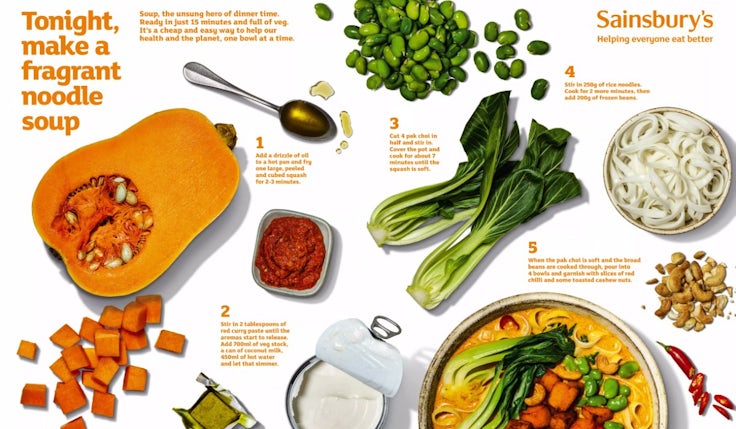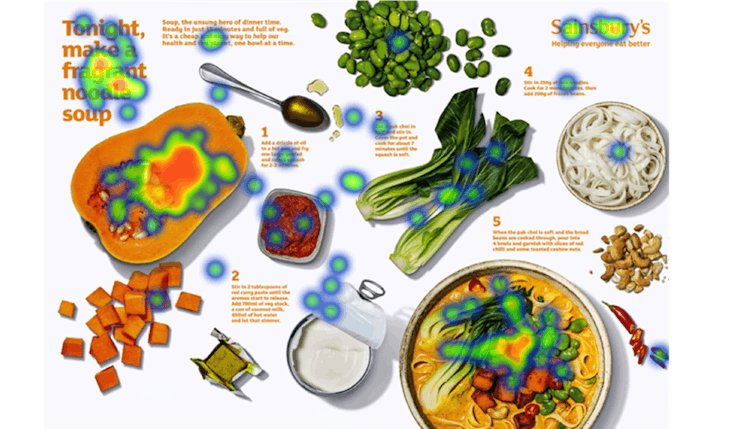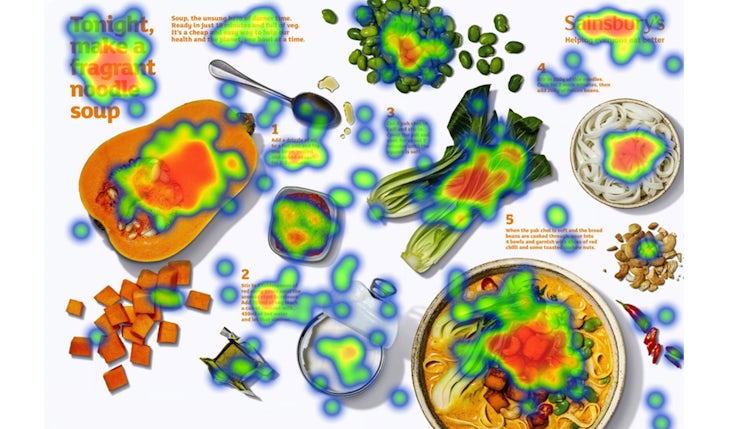Original article is by Michaela Jefferson and featured in Marketing Week, 12 Apr 2022.
Sainsbury’s magazine recipe scored in the top 30% of UK ads for its ability to grab attention, as well as in the top 25% for building salience and the top 10% for brand cues.

With its attention-grabbing colours and brand-building capabilities, Sainsbury’s ‘Noodle Soup’ has ranked as the most creatively effective magazine ad of February in terms of public response, according to Kantar’s ‘The Works’ study.
As well as being an example of how to create effective and efficient magazine advertising that resonates with the public, it also demonstrates how to support positive behavioural change in a way that appeals widely among consumers, the data suggests.
The full-page ad ran in magazines including BBC Good Food, Closer, New! and OK! Weekly between 24 January and 12 February this year.
Speaking to Marketing Week, Kantar’s head of creative excellence, Lynne Deasons, explains that readers are in “complete control” when consuming advertising within a magazine, and so to make an impact, the creative must first grab attention, and then “hook” the reader in to increase dwell time and maximise the “depth of processing”.
That is a “key strength” of this particular ad, she says. Its “bright, vibrant and fresh-looking” visuals land the Sainsbury’s ad in the top 30% of all UK ads on its ability to make readers stop and pay attention.
Noodle Soup also ranks as highly distinctive, scoring in the top quartile of UK ads on this measure. This is “particularly impressive” as recipe ads are a fairly common feature in food and drink related magazines, Deason says.
“This means recipes need to be enticing, distinctive and to benefit the brand they need to be brand centric. This sense of being distinctive and original is important from an effectiveness point of view, because our brains are programmed to pay attention to things that are different,” she explains.
The recipe enables change, overcoming one of the key barriers to the value-action gap – the difference between positive intentions and actual behaviour.
Lynne Deason, Kantar
Produced in association with Marketing Week and the Advertising Association’s Trust Working Group, ‘The Works’ study asked 750 consumers what they thought of five of February’s top magazine ads – 150 consumers per advert.
As per Deason’s analysis, one participant commented that the “visual aspects” of the advert, including the “colour coordination”, are “eye catching” and “really engages the viewer”.
Indeed, the colour palette used in the ad reflects the iconic orange colour of the Sainsbury’s brand, a choice that did not go unnoticed by viewers. Eye-tracking reveals an especially strong focus on the orange butternut squash, and one participant commented: “The food looks fresh, eye-catching, [and there is] the orange for Sainsbury’s.”
Deason explains: “One of the most important roles the squash plays in this ad is that it serves as a very powerful and effective brand cue, helping people notice and remember that this delicious looking recipe is from Sainsbury’s.”
As a result, the ad lands within the top 10% of all UK ads for brand cues, and just shy of the top 20% for branding overall.

The ad’s call to action and recipe title, ‘Tonight make a fragrant noodle soup’, is also one of the first visual elements of the ad that grabs attention.
“Giving precise instructions can help overcome inertia to do something,” Deason explains. “The word ‘fragrant’ also activates brain areas where we process smell, parts of which are directly linked to brain areas responsible for emotions. The headline therefore serves as both a call to action and triggers emotional engagement.”
Building the brand
Ads are “often welcomed and embraced” as part of the magazine experience, with people looking for stimulation and interesting content, Deason adds. Sainsbury’s ad delivers on both those criteria, landing it in the top quartile of UK ads on likeability and the top third for being interesting.
“Given the reader is in control, leveraging creativity to create distinctive, interesting and engaging content is particularly important when you’re in a low interest category,” she adds.
“What we see here is that once readers are hooked in, the ad maintains their interest and earns more attention.”
Indeed, further eye-tracking data reveals the ad to be one people will spend time with, looking not just at the eye-catching squash and title, but subsequently at the ingredients, the soup, the Sainsbury’s logo, and to some extent the recipe instructions.

The surrounding white space allows the bright colours to stand out and makes it easy to read thereby making people feel like it would be easy to make as well, Deason adds.
Participants in the study commented on the “fresh [and] appealing ingredients” and the “easy to follow instructions”, with one adding: “I like that it gave a recipe instead of just trying to advertise the products”.
Overall, the ad succeeds as a brand-building ad. It supports brand saliency for Sainsbury’s, ranking in the top 25% of ads on that measure, and according to Deason also builds both brand affinity and a sense that the retailer is “different to alternatives”, which she says are “key” to driving long-term success as a brand.Jaguar’s LGBTQ+ focused magazine ad named most effective of October
“Brands that are meaningfully different to others command greater share and are primed for growth,” she explains. Noodle Soup sits in the top 30% of UK print ads for potential to build brand equity in the longer term.
A key strategic focus for Sainsbury’s in this ad is to bring to life the supermarket’s new slogan and brand platform, ‘Help everyone eat better’, Deason notes.
“It will take consistency across encounters to clearly establish this as something that defines the brand,” she adds.
Changing behaviour
However, Noodle Soup is not just effective for the Sainsbury’s brand. It is also a “great showcase” of how to support positive behavioural change in a way that appeals to the wider public,” Deason says.
“The concept of nature connectedness, which this ad leans into, is associated with bringing about positive behavioural change from a sustainability perspective,” she explains.
According to Deason, UK retailers have increasingly begun to focus on brand building activities that go beyond competing on aspects of value and quality. How this evolves over the next year, given inflationary pressures and their impact, remains to be seen.
Nearly two-thirds (65%) of people in the UK feel the responsibility for tackling key sustainability issues sits with businesses and producers, not with themselves, according to data from Kantar’s Sustainability Sector Index 2021. At the same time, 63% of consumers worry that brands are involved in social issues just for commercial reasons.P&G vs Dole: Is modern marketing compatible with a sustainable world?
“This shows that it’s key for brands to get the tonality and authenticity of their communications right, and that any associated actions and ways of doing business are 100% watertight,” Deason says.
“At a time when purse strings are tighter, bringing about positive behavioural change is potentially even more challenging.”
Indeed, Kantar’s data shows 83% of Brits also think when people shop their mind is on saving money more than saving the planet, and 79% think sustainable or ethical products are always more expensive.
“Given the pressures on money it’s more critical than ever that businesses take responsibility and resources to ensure that sustainable choices and healthy eating are easy, meaningful, rewarding and affordable for people,” Deason says.
The Index also reveals 76% of people choose meat because they prefer it, and becoming vegan or vegetarian is second to bottom among the things that individuals are willing to do to improve the sustainability of the world.
In this particular ad, Sainsbury’s highlights a meat-free recipe without over-emphasising it as such, Deason points out. As a result, 60% of respondents to The Works study said they were likely to try to recipe themselves, which is particularly impressive as only 46% said they don’t eat meat or are actively trying to reduce their intake.
“It creates a frictionless choice. It cleverly opens their minds to something they otherwise might not have thought about,” Deason says. One participant in the study said: “I didn’t click it was veggie, [it] just sounded good.”
Being distinctive and original is important from an effectiveness point of view, because our brains are programmed to pay attention to things that are different.
Lynne Deason, Kantar
Deason adds: “The recipe enables change, overcoming one of the key barriers to the value-action gap – the difference between positive intentions and actual behaviour. For those that are motivated to do this for the benefits to personal health and sustainability, it makes implementing those intentions easy.”
Elsewhere, data from Kantar’s creative research database Link shows ads with a social or environmental message can evoke positive emotions such as pride, inspiration and affection, but they also tend to make people feel more sad and guilty than seen on average. This can evoke an “ego-threat”, Deason says, which can lead people to reject the message.
However, the only emotions evoked at above average levels by Noodle Soup are positive emotions, such as feeling excited, inspired, contented and proud.
“Our brains are programmed to pay attention to things that are distinctive, that make us feel something and that are meaningful and personally relevant. Noodle Soup delivers this in spades and enables positive behavioural change in a frictionless way,” Deason concludes.


